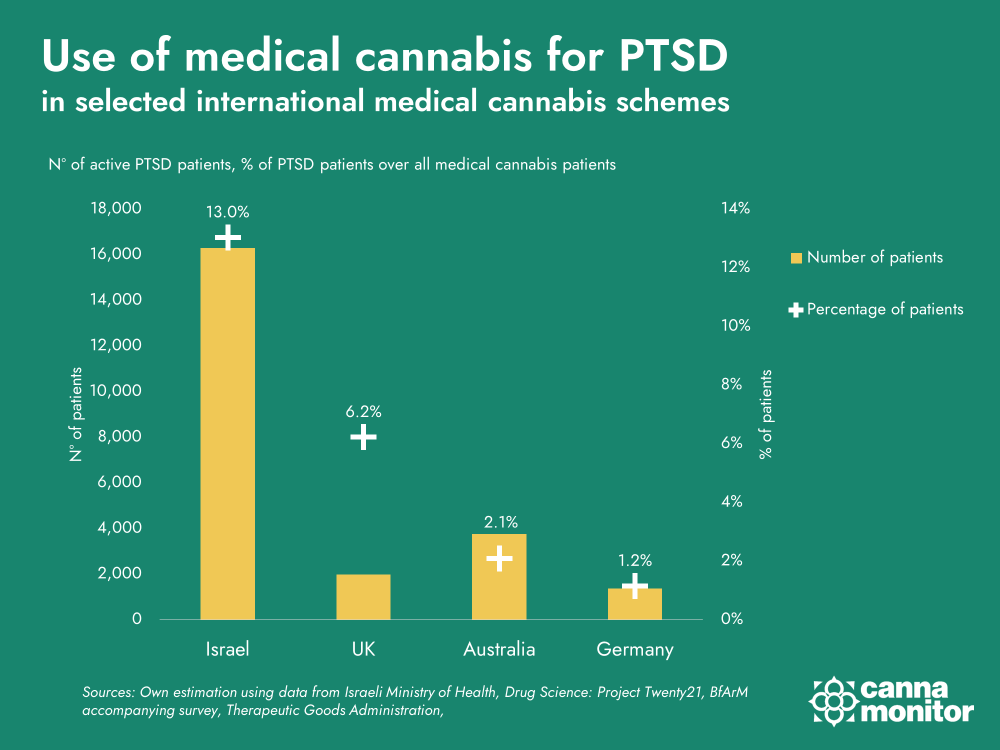Ukraine made the headlines in July 2023 with the announcement of medical cannabis legalisation, in a move with the stated goal to cope with the psychological long-lasting effects of war, and trauma of combat veterans in particular.
Today at Cannamonitor we are discussing the body of evidence regarding the use of cannabis for PTSD, as well as the reality of PTSD use in international medical cannabis schemes such as Israel, Australia and the UK.
Table of Contents
Post-traumatic stress disorder (PTSD) may occur in people who have experienced a traumatic event. People with PTSD have intense, disturbing thoughts and feelings related to their experience long after the trigger event. They may relive it through flashbacks or nightmares; they may feel sadness, fear or anger; and they may feel detached or estranged from other people.
Traditionally, pharmaceutical drugs, including antipsychotics and antidepressants, have been used to manage the symptoms of PTSD, but they often come with undesirable side effects and may not provide adequate relief. In recent years, there has been growing interest in the potential benefits of medical cannabis for treating PTSD.
Inconclusive evidence plagues the use of cannabis to treat PTSD
In July 2023 , the US Department of Veterans Affairs together with the Department of Defense published a clinical practice guidance opposing the use of cannabis to manage PTSD in veterans due to its benefits being “outweighed by the potential serious adverse effects”.
Data analysis of a 2020 survey found a spike in prevalence of last-year cannabis use among US veterans, rising to 12% from 9% in 2014. Data suggested higher use among younger veterans and veterans with psychiatric conditions.
In the US, New Mexico became the first state to specifically list PTSD as a qualifying condition for medical cannabis in 2009, and since then, 36 states have followed suit. Only Alaska does not include PTSD in the list of qualifying conditions or allows doctors to decide, after South Dakota amended its regulations in March 2023.
look at the effects of 3 types of smoked cannabis preparations which showed positive outcomes and high tolerability, but did not outperform the placebo.
Also in Canada, a 2019 epidemiological study found an association between cannabis use and a reduction on depressive and suicidal states among PTSD patients.
However, as evidenced by the VA decision, the lack of quality evidence and experimental design limitations plagues the official endorsement of cannabis for PTSD.
Use of medical cannabis for PTSD in Israel, UK, Australia and Germany

Prescription trends are on the rise with Israel leading the way
In Israel PTSD treatment for veterans has been a hot topic in the last few years due to a a number of veterans immolating themselves following difficulties in getting recognised as suffering from combat related PTSD.
- A 2018 study conducted by the Israel Defence Forces found a prevalence of PTSD of only 2% among veterans of the 2006 Lebanon war, in contrast with 16% among US veterans of the Iraqi and Afghan wars.
- Both patients and PTSD specialists have denounced the tight inclusion criteria and insurmountable levels of bureaucracy to recognise disabilities.
- A survey conducted at Jerusalem’s Herzog Medical Center found exposure to combat situations to be a main factor in developing PTSD, regardless of the designation as a combat or non-combat veteran.
- The prevalence of PTSD among the general population could reach as high as 10% in times of frequent terrorist attacks on the country.
- Israel pioneered the use of medical cannabis for PTSD since the Health Ministry provided guidance on its use in 2014, with the endorsement of the Association of Psychiatrists.
- PTSD is currently the second most-prevalent condition in the scheme, only after chronic pain. In the last 2 years PTSD has outpaced overall patient growth, going from 10% of patients to the current 13%.
- A 2022 study with 10,000 Israeli patients financed by Tikun Olam found moderate or significant improvement without severe side effects in 91% of PTSD patients. Out of of 551 patients with PTSD as a primary indication:
- 94% had sleep disturbances
- 87% experienced anxiety
- 81% had depression
- 52% experienced pain
- 48% used antidepressants
In the UK, in May 2023 Drug Science published interim results from its Twenty21 observational study showing a reduction in the severity of PTSD symptoms following 3 and 6 month follow-ups.
- Similar positive results were found in a 2022 review of the UKMCR with PTSD patients enrolled at the Sapphire Clinics, 89% of which had prior experience with cannabis.
- 49% of patients used flower, while 29% used a combination of flower and oral medicines.
- Median daily doses amounted to 5mg of CBD and 145mg of THC.
In Australia, despite a 2019 systematic review funded by the TGA finding no evidence for cannabis in psychiatric disorders, a 2023 paper highlighted the growing presence of psychiatric conditions among patients authorised to access medical cannabis through SAS-B authorisations:
- Approvals to access medical cannabis for PTSD grew sharply starting in 2020, reaching a level of 250 new monthly approvals at the end of 2022 which is being sustained in 2023.
- 40% of approvals were for flower products and the remaining mostly for oral formats and oils.
In Germany, psychiatrists have remained sceptical of cannabis treatment. PTSD condition sufferers have gotten lower reimbursement approval rates in their applications:
- A 2018 study by health insurance companies showed a lower reimbursement rate for minority psychiatric conditions, compared to a global rate of around 62%.
- Only 32 PTSD patients using flower to treat their symptoms met the criteria to be included in the accompanying survey of BfArM.
Ukraine prepares for medical cannabis legalisation to cope with war
Following the endorsement of legalisation by Ukrainian president Volodimir Zelensky the week before, on the 12th of July 2023, 268 out of 450 deputies in the Ukrainian Supreme Rada voted in favour of a draft law to amend the narcotic law of the country, legalising medicinal cannabis production and distribution.
This unfolds against a backdrop of awareness on the mental health situation caused by the war in Ukraine. An October 2022 international study found that 25% of Ukrainians met the diagnostic requirements for PTSD, with higher numbers among females after experiencing sexual violence.
Tens of thousand of Ukrainian army soldiers are expected to have seen combat in Ukraine, with at least 200,000 serving at any moment as active personnel, amidst the strain on sanitary resources and over 1,000 attacks on healthcare infraestructure. Patient associations estimate that millions of Ukrainians will be in need of cannabis medicines after the war.
The proposed bill would allow cannabis for the following indications:
- War veterans with post-traumatic stress disorder
- Cancer patients
- Epilepsy patients
- Palliative care patients
Industry stakeholders have reported to be in talks with policy-makers in the healthcare committee of the Ukrainian parliament to argue against such provision. Allowing the importation of cannabis APIs or finished herbal products could significantly accelerate access timelines for the patients.
A monumental task for a nation at war. Effective access in Ukraine will probably take time despite the urgencies of war. Trauma caused by the Russian invasion can exacerbate the need for regulation and accelerate bureaucratic proceedings, but Ukraine still needs to develop its regulated supply chain almost from scratch.
More evidence and advocacy with mental health professionals is key
Treating physicians and psychiatrists in particular often remain sceptical of cannabis use to treat PTSD, curtailing the possibility of veterans to access cannabis medicines, which often resort to self-medicating through the recreational channel.
More research is required to unlock the potential of cannabis for PTSD sufferers, as well as more advocacy on the benefits of cannabinoid treatment to address the multi-faceted symptoms of PTSD. A personalised approach to cannabinoid medicine can pave the way by addressing the affective dimensions of PTSD in a more holistic way.
Israel is leading the way with real-world evidence on the benefits of cannabis to treat trauma and its symptoms. Promising research in the UK and Australia shows that those results can be replicated to provide releaf to veterans of war, including tens of thousands of Ukrainian army soldiers.

